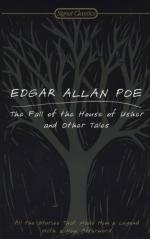|
This section contains 4,590 words (approx. 16 pages at 300 words per page) |

|
SOURCE: “‘The Fall of the House of Usher’: An Apocalyptic Vision,” in University of Mississippi Studies in English, Vol. 3, 1982, pp. 53-63.
In the following essay, Gargano theorizes that the inability of the characters in Poe's “The Fall of the House of Usher” to explain their ordeal is a result of the apocalyptic vision of the narrator, who views events in the Usher house as symbolic representations of the destruction of the world.
Any new discussion of “The Fall of the House Usher,” no matter how adventurous, must be a sort of outgrowth of the accumulated wisdom of George Woodberry, Arthur Hobson Quinn, Edward Davidson, Maurice Beebe, Richard Wilbur, and many other interpreters of Poe's fictional masterpiece.1 The variety of critical response elicited by the tale has an almost infinite suggestiveness: Poe emerges, among other things, as an expert in creating gratuitous terror, as a parodist, a depth-psychologist, a...
|
This section contains 4,590 words (approx. 16 pages at 300 words per page) |

|


